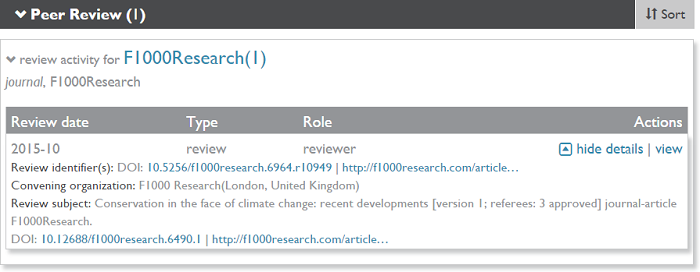Peer review is a fundamental component of the research lifecycle, but reviewers’ contributions can often go unrecognized in a process where anonymity remains the standard. For researchers, using your ORCID iD to enable connections with the organizations for which you perform reviews raises the visibility of your efforts and contributions. For publishers, funders, associations, research institutions, peer review recognition services, and other organizations involved in review, asking your reviewers for their ORCID iD and embedding it in your workflows can help streamline your processes, improve the management of your reviewer databases, and provide your reviewers with public – and discoverable – acknowledgement of their service.
Peer review and ORCID
ORCID introduced functionality during 2015 to facilitate the recognition and exchange of data about peer review activities. Some organizations have worked with us as launch partners helping us to test our new API v.2.0*. Current members with active peer review integrations include include the American Geophysical Union (using eJournalPress), F1000, IEEE, and Publons.
If your organization is interested in using ORCID iDs to acknowledge the contributions of your reviewers, see the peer review getting started guide at our member support center. You also can watch presentations and case studies from our #Peer Review Week 2016 webinar, Peer Review Recognition: One Year Later at our Vimeo channel.
What data are used to cite a peer review contribution?
It is possible to acknowledge the full range of peer review contributions, from double blind to open. We follow the CASRAI Peer Review Services data profile developed by the Peer Review Services Working Group. A citation combines three elements: information about the reviewer, about the organization sponsoring the review, and about the review itself. Importantly, each of these components involves a persistent identifier.
Information about the reviewer
- Role: The individual’s role in the review process, e.g. chair, editor, member, organizer, reviewer.
- Identifier: The reviewer’s ORCID iD
Information about the organizer
- Convening organization: This describes the organization which organized the review – a journal publisher, conference organizer, funding agency, faculty, etc.
- Identifier: The persistent identifier for the organization
Information about the review
- Group: An identifier used for aggregation purposes that describes the group of which the review is part. This could be the name of a journal (Journal of Scientific Investigations) or a publisher (Scholarly Publisher), or a non-specific description (Biology Journal).
- Type: The type of review activity, e.g., a review, evaluation.
- Date: When the review was completed. This can be broad (2008) or specific (2010-12-10).
- Identifier: A unique resolvable identifier provided by the source for the review itself. This is used to prevent duplication of review activity.
- There are several optional fields, which allow the organizer flexibility to acknowledge a range of review types. Many of these fields would not be used in a double blind review, but would be used in an open review. These optional fields include: URL: A link to the representation of the review online; Name: The title of the item reviewed; Type: The type of item that was reviewed, e.g. article, grant, monograph; Container name: The name of main object of which the review is part, e.g. journal, conference, grant review panel, etc.;Item Identifier: A unique resolvable identifier for the reviewed item, e.g. a DOI. URL: A link to the item reviewed online.
Getting your contributions recognized

The peer review section on the ORCID record becomes visible after you provide permissions (via ORCID OAuth sign-in) to a review sponsor and complete your review, and that organization adds the information to your record. Only ORCID member organizations that also have implemented peer review functionality and ask your permission may add peer review activity to your ORCID record. We are working with our partners to create a Search & Link wizard to allow you to import your peer review citations into your ORCID record. Watch this space for more information.
Tell us what you think
We’re always happy to get feedback from the community. Please share your comments and suggestions in the ORCID iDeas Forum. Many of the new features on ORCID have been sourced directly from our iDeas Forum.
* API v2.0 was released in February 2017. All peer review links have been updated to the v2.0 final release version.